- Home
- Mark Chadbourn
The Devil soa-3 Page 2
The Devil soa-3 Read online
Page 2
Dee’s knowledge was dangerous and he needed to be returned to London at all costs, that was certain. But the alchemist revelled in misdirection and illusion, the spy knew. Was this mirror truly the threat Cecil feared? Or in this time of uncertainty had the spymaster simply given in to superstition and fear? Will shrugged. The world was filled with worries, and the truth would present itself sooner or later.
Once he had drained his ale, he selected his subject, a balding seaman with wind-chapped cheeks and a scrub of white hairs across his chin. Nursing a mug, the man leaned against the wall next to the stone hearth, eyeing the flames with the wistful look of someone who knew it was a sight he’d not see again for long weeks. He looked drunk enough for his guard to be low, but not so inebriated that he could not provide useful information. Keeping the brim of his hat down, the spy demanded another drink and walked over.
Will rested one Spanish leather boot on the hearth and watched the fire for a moment before he said, ‘I have never met a man of the sea who was not interested in adding to his purse. Are you that rare creature?’
‘Depends what you need doing,’ the man slurred.
‘All I require are words.’
The sailor’s gaze flickered over Will. He seemed untroubled by what he saw. ‘Ask your questions.’
‘I seek news of two new arrivals in Liverpool who may be requiring passage to Ireland. A woman with hair as fiery as her nature and a tongue that cuts sharper than any dagger. And a man. .’ The spy paused. How to describe Dr Dee in a way that would do the magician justice? ‘White hair, blazing eyes, a fierce temper, and a slippery grip on the world we all enjoy. He may have been wearing a coat of animal pelts.’
‘I have heard tell of them, an Abraham man, mad as a starved dog, accompanied by his daughter,’ the sailor grunted. ‘The woman cut off the ear of Black Jack Larch, so I was told. His only crime was to lay a hand upon her arm and ask for a piece of the comfort she promised.’
‘That would be Red Meg.’
The seaman smacked his lips, watching Will’s hand. The spy unfolded his fingers to reveal a palmful of pennies. Snatching the coins the man continued, ‘They bought passage to Ireland on the Eagle, sailing at dawn. Wait at the quayside and you will see them.’
‘I would prefer to surprise them before sunrise. Where do they stay?’
‘The woman took Black Jack’s shell outside Moll Higgins’s rooming house. You could do worse than to seek them there.’
‘You have earned yourself another drink. Go lightly on the waves.’ Will gave a faint bow of the head and turned towards the door. He found his way blocked by three men, hands hanging close to their weapons.
‘What ’ave we ’ere, then? A customs man come to spy on us?’ the middle one growled. His left eye was milky, a jagged scar running from the corner to his jaw. He wore an emerald cap and his voice had the bark of authority; a first mate, perhaps, Will thought.
‘Why, you are good honest seamen. I could find no rogues or smugglers here,’ Will replied, his tone as laconic as his gaze was sharp. ‘Step aside. My business here is done and I will disturb your drinking no more.’ He knew any sign of weakness would only encourage the drunken men further.
The sailor’s one good eye flickered from left to right, and in an instant strong hands gripped Will’s arms. Someone tore off his hat. The sailor whisked a dagger from the folds of his dirty linen shirt and pressed the tip under the spy’s chin, forcing his head up. A blast of ale-sour breath washed over Will as the man searched his features. Silence fell across the rest of the inn. The other drinkers crowded round.
One of the women leaned in, her eyes narrowing. ‘I know ’im,’ she said in a broad accent. ‘That’s Will Swyfte, that is. England’s greatest spy.’ A lascivious smile sprang to her lips. ‘I would see the length of your sword, chuck.’
‘Later, in the privacy of your chamber, perhaps. Let us not point up how dull are the blades of these fine men.’ He held her gaze and her smile broadened.
‘The great Will Swyfte,’ the one-eyed man mocked. ‘The dewy-eyed women and the witless fieldworkers might be easily dazzled by your exploits, but here you are just another sharp nose poking into our business.’
‘Your business concerns me less than the contents of your privy. I am troubled by greater matters: the security of this realm.’
‘Stick ’im now. We’ll dump him in the drink and no one’ll be the wiser,’ another sailor said. ‘Let ’im walk out and we’ll be swarming with tax collectors like rats on the bilge deck.’
Will’s dark eyes flickered over the leering, grizzled faces pressing all round him. He had been here before, too many times, and whether he was looking into the eyes of Spanish pikemen or Kentish cut-throats, he knew the signs; there was no point in further talk.
Wrenching his shoulders back, he unbalanced the two men gripping his arms. With one sharp thrust, he planted a boot in the gut of the sailor wielding the knife. The milky-eyed seaman doubled over with a forced exhalation. Will saw that the drunken sailors were taken by surprise by the suddenness of his movement, and smiled. Sober, they would be a formidable army of cutthroats. Soaked in ale, they wheeled around like small children.
Tearing his arms free, the spy lashed one foot under a three-legged stool and heaved it into the face of his former captor. Bone shattered, blood sprayed. A roar rang up to the rafters. Squealing whores ran for the rickety stairs at the back of the inn. The seamen drew daggers and hooks, each weapon glinting in the candlelight. The men surged forward.
Will felt the familiar heart-rush. He drew his rapier, enjoying the familiar feel and weight in his hand. With one bound, he leapt from a bench to the innkeeper’s cluttered trestle. Cups flew. Coin jangled on to the boards.
‘Who will be the first to feel the bite of my blade?’ he called, kicking the barrel. The wooden tap burst free, the honey-coloured ale gushing out. The keg spun off the table and into the path of the onrushing seamen.
The spy felt no desire to kill any of these rogues; he wished to save his steel for more deserving blood. But they swarmed around him like angry bees, eager to sting him to death. It was as he searched for a route past them that the flagstones began to vibrate as though the trestle were being dragged over cobbles. The sailors came to a sudden halt, eyeing each other with unease. Across the inn, the candle flames sputtered and shuddered as one. Shadows swooped. Breath clouded as a winter chill descended. The sailors murmured, casting anxious glances all around. One by one they put away their weapons.
Through the small, square windowpanes, distorted lantern-light danced in an unnatural manner from the carrack. A moment later, the door crashed open. The master of the quay lurched into the space, his hat askew, his face drained of blood. ‘Take up your weapons and any light you can find,’ he croaked. ‘The devil has come with the fog.’
CHAPTER TWO
The thick fog muffled even the creaking of the sign above the entrance to the inn. Nothing of the quayside was visible, nor any of the lights of Liverpool beyond. Never had Will known such a dense mist to sweep in so quickly. In the time it had taken him to push his way past the quay master and find a hiding place outside, the grey folds had billowed in from the west, consuming all in their path.
He crouched behind the dank-smelling rain butt at the edge of the stone frontage, watching the sailors flood out of the inn and clatter across the cobbles with pitch-soaked brands to light their way. The fog swallowed them in an instant. Distorted calls and responses floated back, before they too were lost. They were simple men, easily frightened by things beyond their understanding. But Will suspected that whatever it was that accompanied the unnatural mist would dwarf their present fears.
Moisture dripped from the inn sign. An angry cry rang out from near the water’s edge. A dull querying rejoinder from somewhere further afield, the splintering of breaking wood: odd sounds, incomprehensible in their muted isolation. Will waited, his fingers clenched round the hilt of his rapier.
He sensed
the strangers long before he saw them. His head throbbed, his stomach churned. Blood bubbled around his left nostril. Familiar signs, all of them. They were coming, those foul things that had thrown his entire life off its course. Cold anger burned in his chest as his thoughts took him back from that misty autumn night to the hot summer day in Warwickshire that he could never escape. Jenny was there, then, as she was always in his heart, waving to him across the cornfield, her dress the pure blue of forget-me-nots, brown hair tied back with a matching ribbon. One moment, frozen for ever, along with all the promises of shared summers yet to come. In the blink of an eye, she had vanished. No trace remained behind, no path through the corn to show where she had gone, no footprints. No body. Gone as if she had been whisked up to Heaven by a choir of angels.
Will peered round the water butt at the figures emerging from the folds of grey. No, it was these devils who had stolen Jenny away, he knew now. For what reason, he had no idea, and the mystery of it still sickened him. But never would he give up hope that she was still alive, whatever his friends said. Over the years he had learned enough to convince himself that she did still live, that she was a prisoner somewhere — perhaps across the sea, in the New World where men said the Unseelie Court made their home. Everything he did, every battle he fought, every sacrifice he made, was to find some way to bring Jenny home. She was all that mattered. Not his life and not, though he would never give voice to it in public, his Queen or country.
Four figures swooped forward with near-silent tread, at first almost as insubstantial as the fog that enshrouded them. But when a sailor sprawled across the glistening cobbles, they appeared to coalesce, and take on flesh and bone. Dread crept across the still quayside. Despite himself, Will felt the hairs on the back of his neck prickle. Here they were, the sum of all human fears since the days of the Flood: the grey men, the Fair Folk, the Fay; their names seemed endless, a way for mortals to skirt around the essential horror that lay at their heart. Three were swathed in grey cloaks and hoods, cold faces as pale as the first snows of winter and eyes black as coals. The fourth was the leader, Will was certain. He sported a beard and moustache waxed into points, and his black hair was long and sleek. His eyes were lost to shadow, but hard lines edged his mouth and when he smiled he revealed sharp teeth.
‘My name is Lansing,’ he murmured, looming over the fallen figure. ‘Others are the wits of the High Family, or the cunning. I am the blade.’ And he whispered into the terrified man’s ear, whispered words that were poisonous and corrupt, words that piled horror upon horror — words that would drive a man mad. Will clenched his fingers round his sword-hilt tighter still, so that his knuckles grew white. He wished he could drive his blade into Fay flesh to ease his anger, though he knew he could never defeat four of them.
When the sailor curled on the cobbles whimpered, the spy recognized the balding man he’d talked to at the Eight Bells. At the same time, he heard the Fay lord say, ‘Tell me now, while you can, where I will find this man, the sorcerer John Dee. Once we have him, there will be an end to this long strife and you will know peace. All of you.’
Will cursed under his breath. The words were comforting, their true meaning deeply disturbing. If the Unseelie Court hunted the alchemist so brazenly, then the matter was more grave than he had been led to believe. He could not afford to allow the hidden Enemy to reach Dee ahead of him, for then he would have seen the last of Elizabeth’s conjurer, and most likely the last of England.
As Lansing continued to question his prisoner, Will lifted down the iron lantern beside the inn door, and wrapped his cloak around it to shield the moving light. He crept along the wall to the cover of the mounds of bales and spice-scented boxes that had been unloaded before sunset.
Running feet echoed close by. Orange light flared across the wall above his head, and he dropped to his haunches just in time. He could smell the acrid pitch-smoke and hear the sputtering of the brand. Three drunken sailors argued about what devils were loose in Liverpool. They would find out soon enough, Will thought.
Sneaking to where he could hear water lapping in the shadow of the great vessels at anchor, he used his nose to find the reeking barrel of pitch the shipwrights used to seal the hulls. He heaved the heavy butt on to its side and flung the lantern into the slopping contents. As the pitch ignited and the flames roared out, he rolled the barrel hard. The blazing keg hurtled across the quayside to where the Fay were cloaked by the fog.
Cries of alarm rang out along the water’s edge. Blazing brands flickered in the dense bank of grey cloud like fireflies on the wing, circling back to where the burning barrel painted the fog orange. The Unseelie Court worked their cruelties best in the shadows. No doubt they would melt away long before the fear-filled sailors discovered them. But had he done enough to disrupt their interrogation before they discovered Dee’s whereabouts?
As the tumult swept towards the crackling fire, Will raced into the rat’s nest of narrow streets leading away from the dock. The ghost of the Unseelie Court still lingered, a cold breath on the neck in a midnight churchyard. The town was dark, but his mood was darker still.
CHAPTER THREE
Liverpool tumbled away down the hillside towards the River Merse where the thick fog bank held its breath, waiting. Yet above the town the night was clear, the Everton Beacon stark against the starry sky. Moonlight limned the blue-tiled rooftops. Candle flames glowed in diamond-pane windows. Here was life, grubby and bloody and loud. Down on James Street, not far from the black bulk of the Old Castle, packs of sailors roamed like dogs from stew to tavern, lured by the fresh meat calls of the competing whores displaying their breasts in the lamplit doorways. Snarls and snapping punctuated the drunken laughter. Bruised knuckles crashed against jaws as rivals brawled, rolling among the contents of emptied chamberpots to the baying of their yellow-toothed fellows.
Liverpool stank of brine and cesspits and smoke.
One desperate doxy keen to earn her bed for the night ventured into the shadowed alley where she had glimpsed three men lurking. From the gloom, John Carpenter watched her approach. Pulling down the front of her dirty emerald dress, the rouge-smeared woman put on a seductive smile. ‘Come hither, lads,’ she called, hands on hips. ‘The comfort of these thighs will give you sweet dreams when you’re tossing away on the waves.’
When she saw one of the men step from the enveloping dark, she breathed a relieved sigh. Carpenter knew her thoughts: a few moments of grunting was a small price to pay for a good night’s rest. And the well-cut grey doublet and grey woollen cloak, free of stains and wear, suggested a gentleman, no less. Then a shaft of light from the lantern over the door of the White Hart struck his companion’s face and she all but cried out. His skin was bloodless, and his dark eyes held a hellish glow.
‘Away, you pox-ridden whore,’ Robert, Earl of Launceston, ordered in a voice like autumn leaves. ‘Trouble us no more or feel the prick of my dagger — and not the kind you are used to.’
Realizing it was a man after all and no grim spectre, the doxy cursed at the shock she had been given. She turned to summon the sailors to teach this elf-skinned scut a lesson. Before she could cry out, Carpenter leapt from the shadows and placed one hand on her mouth to stop her. His hazelnut doublet was of a rougher cut than his fellow’s, but still clean, and though his long, dark hair fell oddly across the left side of his face, he eased a charming smile on to his lips to soothe her. He pressed a silver coin into her grimy palm and released his hand from her mouth.
‘My friend has poor manners, mistress. He knows not what it is like to work hard for a living,’ he said, with a bow. ‘Take this and buy yourself a night off your back.’
The woman giggled and curtsied, flashing one fleeting murderous glare at the Earl as she darted towards the inn to spend her earnings on drink. Once she had gone, Carpenter turned on the noble and hissed, ‘Sometimes I think you are more of a threat than our enemies.’
‘I am heartened to learn that you think. ’Twas my assumptio
n that you had the wits of a hound, running round in circles yapping and baring your teeth before hunting for food and sleep.’ The Earl peered past his fellow spy with studied disinterest, searching the passing faces for the missing Dee. He was a gaunt man, slim but powerful, yet even those who did not know him recognized that there was something askew, something strange about the way his cold gaze penetrated as though he were peering through skin and muscle to see the sticky organs within, or the manner in which his hand twitched towards his hidden dagger with unsettling regularity.
‘I should give thanks that you did not slit her throat there and then,’ Carpenter sneered. He pulled his black cap low over his eyes. ‘One full day without you trying to skewer an innocent. Let us celebrate!’ He felt weary from the effort of restraining his companion’s murderous instincts and exhausted by the lonely, unceasing work of the spy. He wanted to be free of that world; even the mundane life of a book-keeper held its attractions, or that of a tailor. Anything. Unconsciously, he scratched the scars that marred his face beneath the fall of his hair, the mark of the thing that had attacked him in Muscovy and a constant reminder of the price this business exacted from him.
‘You bicker like old women,’ the third man in the alley whispered. Tobias Strangewayes was new to their band, as raw as a country apprentice. Red-headed and wiry, the younger man had fancied himself as good a spy and swordsman as Will Swyfte. But when he discovered the true nature of the threat they faced, his arrogance was blunted. Strangewayes still thought highly of himself; he proudly showed off the blue silk lining of his cloak, like some fop parading in Paul’s Walk, but Carpenter knew he could be relied upon in a fight.

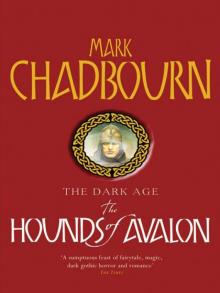 The Hounds of Avalon tda-3
The Hounds of Avalon tda-3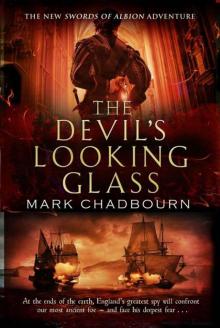 The Devil's Looking-Glass soa-3
The Devil's Looking-Glass soa-3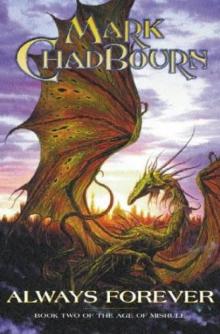 Always Forever taom-3
Always Forever taom-3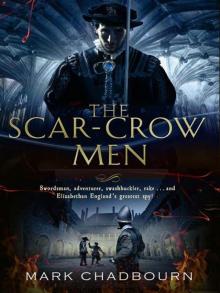 The Scar-Crow Men
The Scar-Crow Men Destroyer of Worlds kots-3
Destroyer of Worlds kots-3 Jack of Ravens kots-1
Jack of Ravens kots-1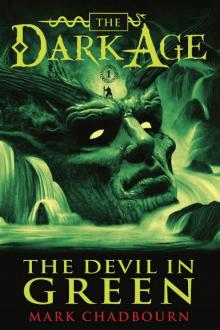 The Devil in Green
The Devil in Green World's End
World's End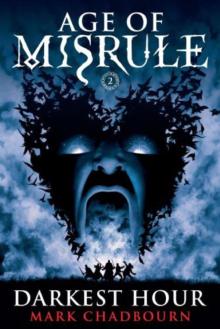 Darkest Hour (Age of Misrule, Book 2)
Darkest Hour (Age of Misrule, Book 2) Destroyer of Worlds
Destroyer of Worlds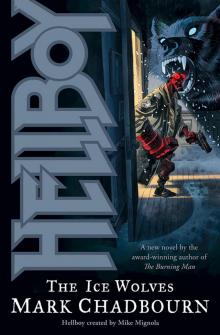 The Ice Wolves
The Ice Wolves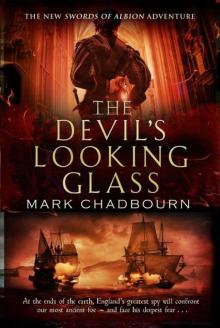 The Devil soa-3
The Devil soa-3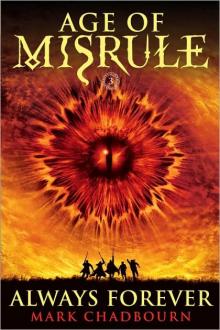 Always Forever
Always Forever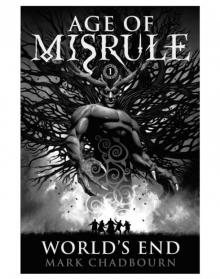 World's End (Age of Misrule, Book 1)
World's End (Age of Misrule, Book 1)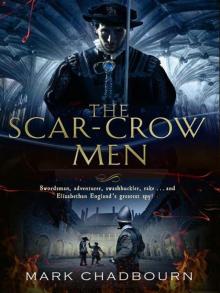 The Scar-Crow Men soa-2
The Scar-Crow Men soa-2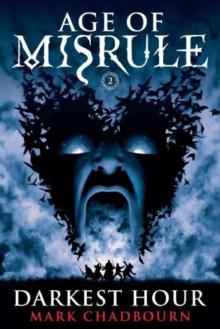 Darkest hour aom-2
Darkest hour aom-2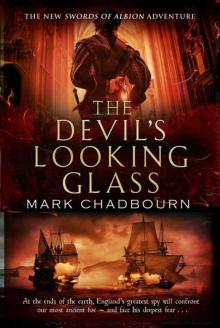 The Devil's Looking-Glass
The Devil's Looking-Glass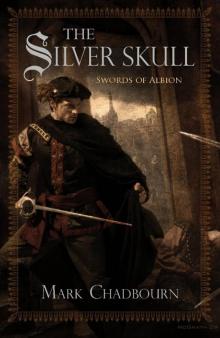 The Silver Skull
The Silver Skull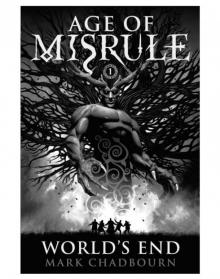 World's end taom-1
World's end taom-1 Jack of Ravens
Jack of Ravens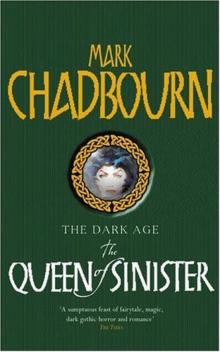 The Queen of Sinister
The Queen of Sinister